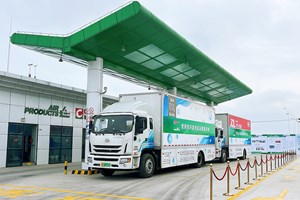News
Air Products and Chengzhi to drive zero-emission heavy transportation in China’s Yangtze River Delta
Air Products has partnered with Chengzhi Shareholding to accelerate transport decarbonization in China’s Yangtze River Delta. The two companies, through their joint venture, have launched their first commercial-scale H2 fueling station in Changshu city, Jiangsu province, capable of fueling city buses and heavy-duty trucks in logistics.
Wei Junmin, President of Chengzhi, said, “Chengzhi shares Air Products’ commitment to China’s net-zero transition and is pleased to extend our long-term partnership to support green transportation by leveraging the strengths of both companies. Our first H2 station in Changshu has been in operation for several months fueling public transport and truck fleets. We look forward to deepening our collaboration to accelerate the development of H2 vehicles and the H2 value chain.”
Under service contracts, the station fuels H2 fuel cell trucks of various multinational and domestic companies, including Budweiser China, Yum China, the logistics service provider of Nestle China and JD Logistics, to pilot zero-emission logistics operations. These include a 49-ton heavy-duty H2 fuel cell truck of Budweiser running between Nantong and Suzhou in East China which has recently logged over 10,000 safe kilometers.
Since the Changshu H2 Fuel Cell Vehicle (HFCV) Industry Development Plan was issued in 2019, Changshu has been actively pushing for HFCV development and initially formed a relatively complete industrial chain to link into the H2 corridor construction in the Yangtze River Delta Region. The city is part of the Shanghai cluster for the national HFCV demonstration project.
Saw Choon Seong, China President at Air Products said, “H2 plays a key role in decarbonizing transportation. Air Products is honored to leverage our experience and technologies, join forces with Chengzhi and support the customers’ pilot projects to drive net-zero transition in China’s mobility sector. The Changshu station is part of our strategy to support the commercialization of H2-powered heavy-duty vehicles and development of the HFCV demonstration clusters. We will continue to pursue opportunities and take actions to help the government achieve its dual carbon goals.”


